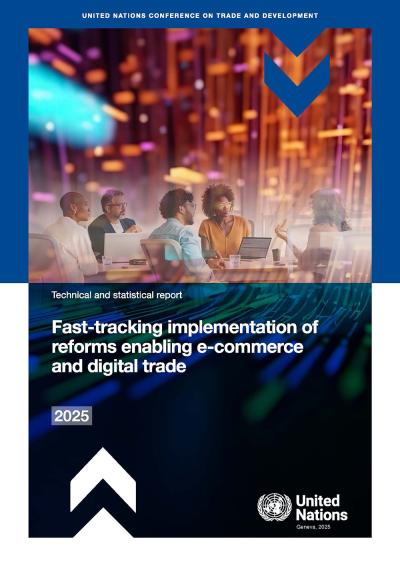
In an era where digital transformation is rapidly reshaping the global economy, the ability to harness the potential of e-commerce and digital trade has become essential for developing countries. This new report, prepared in the context of UNCTAD’s eTrade Implementation Support Mechanism, is the fourth in a series of implementation reviews conducted since 2020. It underscores the role of UNCTAD, including through the eTrade for all initiative, in helping countries advance in the implementation of policy recommendations and actions contained in their eTrade Readiness Assessments and national e-commerce strategies.
Covering 23 countries across Africa, Asia, the Pacific and Latin America, along with three regional organizations – the East African Community (EAC), the Economic Community of West African States (ECOWAS) and Pacific Islands Forum (PIF) – the report is structured in two parts.
The first part examines progress in developing e-commerce policy and governance frameworks, monitoring mechanisms and capacity-building efforts.
The second part highlights broader ecosystem developments and impactful national and regional initiatives benefiting businesses and consumers.
The report also features case studies on Cambodia, Kenya and Vanuatu, offering practical insights into country-led reforms in diverse contexts.
The review captures a rich mosaic of experiences, highlighting both progress and persistent challenges:
- Countries such as Fiji, Kenya, Trinidad and Tobago and Zambia have recently adopted e-commerce strategies, while Peru, Rwanda and Senegal are embedding e-commerce into their national development plans. Regional bodies like the ECOWAS, EAC and PIF are advancing related e-commerce initiatives – yet, weak political prioritization, institutional fragmentation and limited resources remain key obstacles.
- Emerging governance mechanisms in Cambodia, Jordan and Vanuatu – such as inter-ministerial committees and multi-stakeholder platforms – are promising but often constrained by limited capacities and funding.
- Peru, Rwanda, Senegal and Tunisia are developing national observatories and data tools to track e-commerce trends, but statistical gaps persist due to inconsistent definitions and the predominance of informal, mobile-based commerce.
- National initiatives like fibre optic roll-out in Côte d’Ivoire and Malawi’s Digital Acceleration Project aim to boost connectivity and digital service delivery, while regional customs and trade corridors in East Africa are expected to reduce transaction costs. Paperless trade, however, remains a bottleneck in many countries, signalling the need for further digital integration.
- Countries including Cambodia, Kenya and Rwanda are implementing digital finance strategies, while regional initiatives like the Pan-African Payment and Settlement System are paving the way for integrated intra-African payments. To foster trust, EAC and PIF are advancing harmonized regulations on e-commerce, data protection and cybersecurity, and countries such as Kenya, Mauritania and Zambia are adopting national Artificial Intelligence strategies.
- Initiatives in Kenya, Senegal and the Solomon Islands are expanding digital education and youth entrepreneurship programmes, with growing support for innovation hubs and public-private partnerships. Access to early-stage capital remains a major challenge, though efforts in Bangladesh and Mauritania aim to close financing gaps.
The insights gathered offer valuable lessons for policymakers, development partners and stakeholders working toward inclusive digital growth. At the multilateral level, the Global Digital Compact, adopted as part of the Pact for the Future, provides a timely framework for collective action, emphasizing the need to bridge digital divides and align digitalization with broader development goals.
The report aims to support the objectives of the Compact by offering a granular analysis of the quality of reform processes enabling e-commerce, helping to foster better policy design, coordination and investment at national and regional levels.
It concludes that progress is greatest when e-commerce and digital trade are prioritized at the national level, supported by strong inter-ministerial coordination, inclusive multistakeholder dialogue and evidence-based policymaking, and aligned with the principles and commitments endorsed by the international community.


